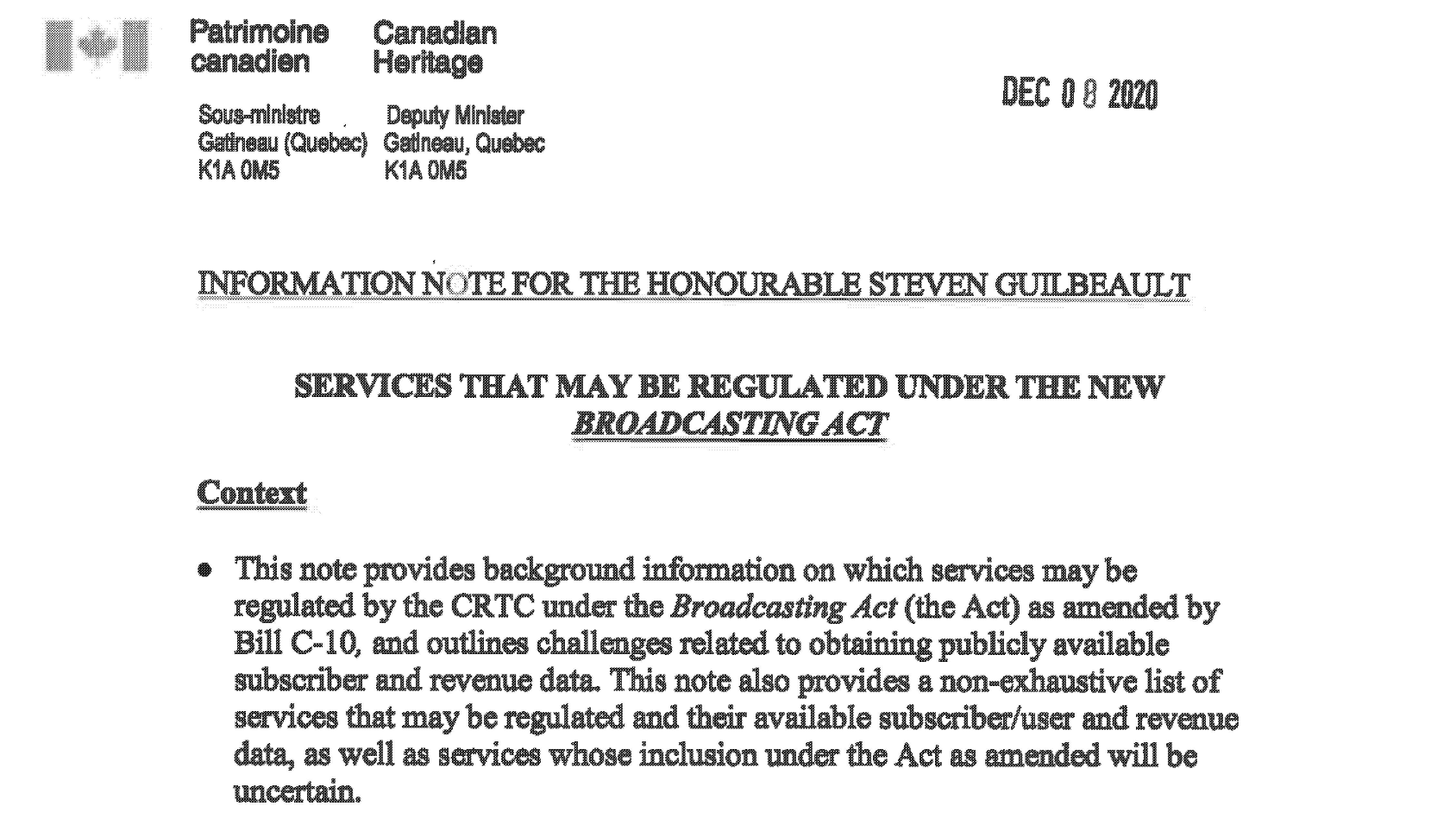Google, which did not appear before the Standing Committee on Canadian Heritage as part of its study on Bill C-10 (neither did TikTok, Facebook or other big tech companies with the exception of Netflix), has spoken out over concerns with Bill C-10. The post warns of the “possible unintended consequences that could negatively and unnecessarily impact” both creators and Canadian Youtube users. The company is particularly concerned with the discoverability requirements that have been expanded to include user generated content:

Canadian Heritage Memorandum, December 8, 2020, ATIP A-2020-00498
Bill C-10
Liberals, NDP and Bloc Vote Down User Generated Content Safeguards as MPs Defend Deeply Flawed Bill C-10 Committee Study
The Standing Committee on Canadian Heritage continued its clause-by-clause review of Bill C-10 yesterday, spending the full two hours debating a Conservative amendment that would have restored the user generated content safeguards that were removed when Section 4.1 was dropped from the bill. The Conservative amendment effectively offered the parties a “do-over” by acknowledging that the removal had sparked huge public concern over the implications for freedom of expression and net neutrality. Nevertheless, the Liberals, NDP, and Bloc voted down the motion, with the NDP not even bothering to speak to the issue at all.
While the three parties were not supportive of addressing the user generated content concerns, they were quick to defend any suggestions that the study of Bill C-10 had been flawed and excluded important voices. For example, when Conservative MP Rachael Harder began reading comments from Scott Benzie on the harms to digital-first Canadian creators who did not appear before the committee (citing the likes of Lily Singh, Molly Burke and thousands more), Liberal MP Anthony Housefather jumped in with a “point of clarification” that the Conservatives could have invited Benzie as a witness (he said the same to me in a Twitter exchange). Bloc MP Martin Champoux also took issue with suggestions that the consultation had been incomplete, stating that there had been 121 witnesses.
The Law Bytes Podcast, Episode 90: Fenwick McKelvey on Bill C-10, Discoverability and the Missing Representation of a New Generation of Canadian Creators
Weeks into a high profile debate over Bill C-10, the issue of discoverability of Canadian content has emerged as a policy tug of war between supporters that want the CRTC to intervene by mandating the discoverability of Canadian content on sites such as Youtube and Tiktok and critics that argue the approach would raise significant freedom of expression and net neutrality concerns.
But what exactly is “discoverability” and how would it impact both users and the thousands of Canadian creators that have already found success on digital platforms?
Fenwick McKelvey is a communications professor at Concordia University who has written more about the discoverability and algorithmic media than anyone in Canada. He has regularly participated in CRTC hearings and was the co-author of a leading study on the issue commissioned by Canadian Heritage. He joins the Law Bytes podcast to talk about discoverability, his frustrations with its implementation in Bill C-10, and the potential consequences for Canadian creators.
This is Who the Canadian Government Wants to Regulate the Internet
The CRTC yesterday released its wholesale Internet rates decision, shocking the industry and consumer groups by reversing its 2019 ruling and virtually guaranteeing increased costs for consumers and less competition for Internet services. Indeed, within hours, TekSavvy, one of the largest independent providers, announced that it was withdrawing from the forthcoming spectrum auction and would no longer offer mobile services. In other words, the competitive and consumer cost reverberations from the decision will impact both broadband and wireless services. When the increased costs coming from Bill C-10 for Internet services are added to the equation, the Internet could get a lot more expensive in Canada.
Much of the blame rests with the government as it appointed CRTC Chair Ian Scott, who has presided over a dismantling of a pro-consumer, pro-innovative policy approach. Moreover, the former ISED Minister Navdeep Bains opened the door to this decision last summer by inviting the CRTC to re-examine the 2019 decision and current ISI Minister Francois-Philippe Champagne is seemingly completely uninterested in his own department’s digital files. I’ve written that this government has become the most anti-Internet government in Canadian history and the path that led to yesterday’s decision vaults to near the top of the evidence list.
Why Bill C-10 Undermines the Government’s Commitment to the Principle of Net Neutrality
Bill C-10 was once again a major topic of discussion during Question Period in the House of Commons yesterday, with questions focusing on the broad scope of the law, freedom of speech concerns with regulating user generated content, and the inconsistencies in Cancon rules. Yet the issue that seemed to garner increased attention was whether Bill C-10 violates the government’s longstanding commitment to net neutrality.
The net neutrality issue was sparked earlier this month by Canadian Heritage Minister Steven Guilbeault, who suggested in an interview that critics of Bill C-10 were supporters of net neutrality, a comment that many took to indicate a shift away from supporting net neutrality. The government has since denied a change in policy and maintains that Bill C-10, which includes the discoverability rules that would empower the CRTC to prioritize or de-prioritize content on user social media feeds, does not undermine net neutrality.











